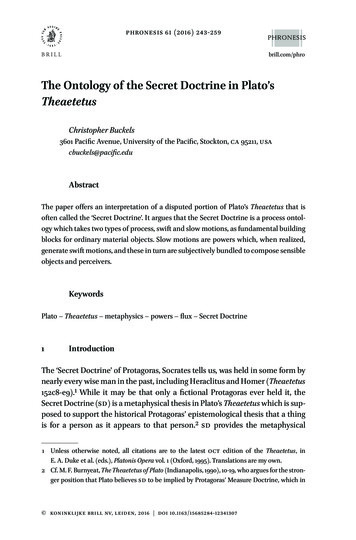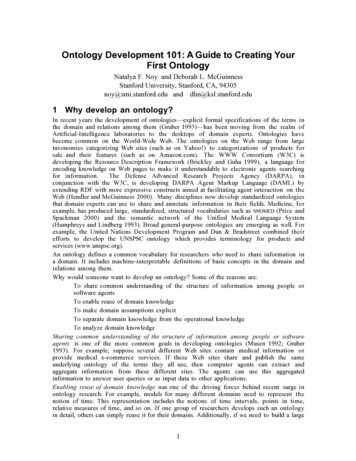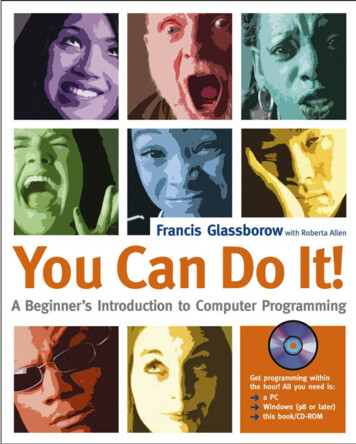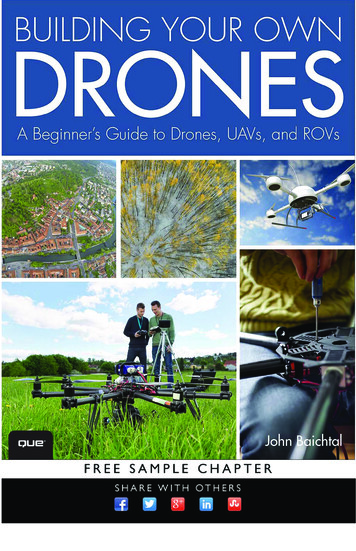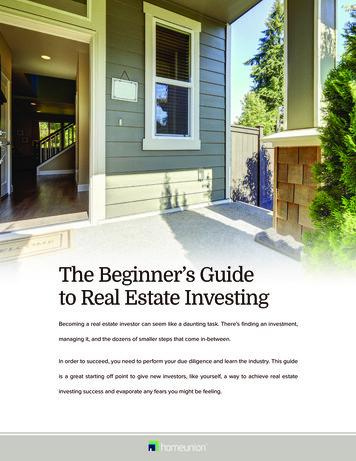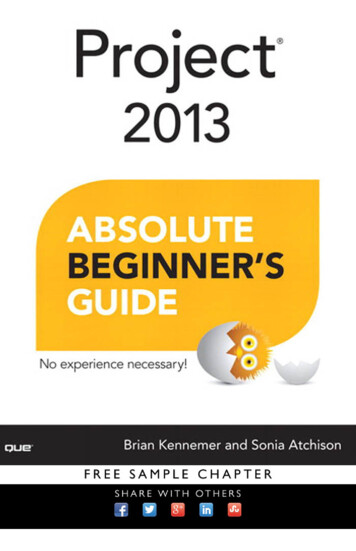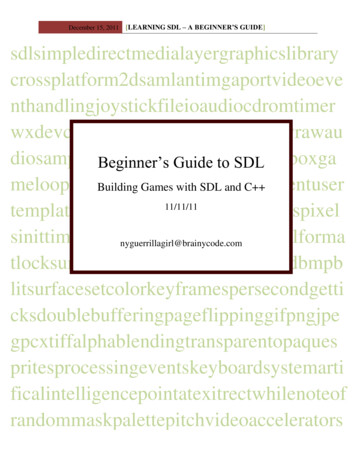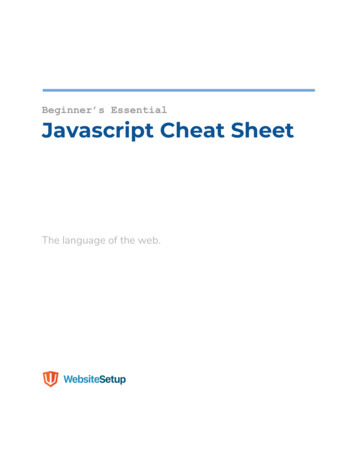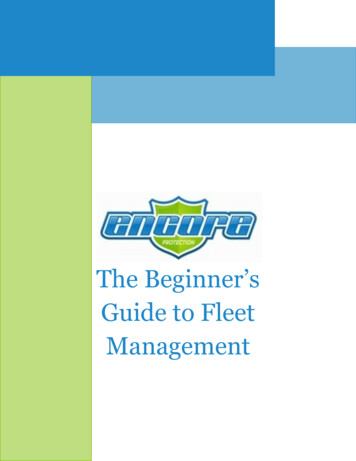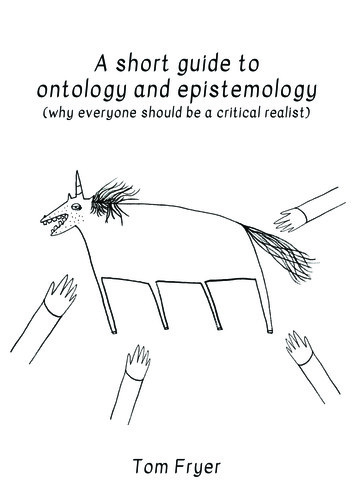
Transcription
‘For the beginner, ontology, epistemology and the whole philosophy of social science can bea maze: it's hard to know which way to turn because it's impossible to see the map. TomFryer has been through that maze recently enough to remember exactly how that feels andhe has sketched out the main contours of the map to get you started on the route.Accessibly. Brilliantly. CriBcal realist-ly. I thoroughly recommend reading it.’Dr Dave Elder-Vass, Loughborough University‘This is a really helpful guide for anyone who gets mixed up with philosophical terms likeontology, epistemology, posiBvism, construcBvism and criBcal realism. Before reading it, Icouldn't imagine that these concepts could be explained in such an easy (and fun!) way.’Ying Yang, University of Manchester‘This guide is perfect for PhD students who want to understand what they do and don’tunderstand and how they might go about understanding more based on how theyunderstand what they understand. Understand?’Bobbie Du on, University of Manchester‘You’re wriBng a guide about what now?’My Gran, Unaffiliated1
A short guide to ontology and epistemology: why everyone should be a criFcal realistTom Fryer, 2020Sryer.com/ontology-guideSharingOpen access: some rights reservedAnyone can download, save, perform or distribute this work in any format, includingtranslaBon, without wriVen permission. This is subject to the terms of the CreaBveCommons License Deed: AVribuBon—NonCommercial—NoDerivaBves 2.0 UK: England andWales. Please ask the author for permission to use this work for purposes other than thosecovered by the license.Cover and design: Joanna KozakThanksI’d like to thank a number of people for making this guide possible. First of all, I’m verygrateful to the Bhaskar Memorial Fund for taking a risk and funding this project. For theinsights, suggesBons and edits I owe much to Bobbie, Parise and Dave. More generally,thanks to everyone who’s listened to me banging on about criBcal realism and helped methink about how to (and how not to) share its insights. Also, thanks to Joanna for theamazing illustraBons—I’m ge ng close to 83% convinced that design maVers 2
Howdy.Let me start off by saying congrats on ge ng into a postgrad programme. It’s no simplething to do and definitely deserves a pat on the back.I hope you’re excited to get cracking on things. I remember feeling this weird combinaBon ofanxiety, but being raring to go, excited, as well as a bit overwhelmed. It’s Bring feeling allthat at once.That’s why I wrote this guide. I hope it makes your life a liVle easier and helps you thinkabout one really important part of your research.I’d be willing to bet a serious amount of money that at some point over the next couple ofmonths you’re going to hear someone menBon ‘ontology’, ‘epistemology', ‘researchparadigms’ and ‘philosophical assumpBons’. If you’re lucky you might even come acrosssomeone cha ng about ‘normaBvity’. Most unis run some kind of training programme fornew postgrads, so you’ll probably come across these terms, as well as the occasionalreference to ‘posiBvism’, ‘construcBvism', ‘interpreBvism’, ‘criBcal realism’, ‘pragmaBsm’ and‘subjecBvism’.The first point to make is that you are not stupid.That’s not quite right. I’ve not got the foggiest how smart you are and I’m not trying to besome kind of moBvaBonal speaker. Anyone who knows me can vouch for that Let me clarify. If you’re bamboozled by all the different terms then don’t take this asevidence that you’re stupid. There’s a stupid number of terms, used in a stupid number ofways, to refer to a stupid number of different things. It really isn’t you.Faced with this situaBon, it’s super tempBng to just give up. You might go as far as figuringout a couple of sentences that you can wazz in your thesis like: “I adopt a pragmaBst stancebecause I believe your methodology should respond to the research quesBons being asked”.If you’re feeling keen, you might even read CroVy’s (1998) The FoundaFons of SocialResearch and pick your philosophical approach from his ‘oven-ready’ versions.Please don’t do this.I’m not normally prone to melodrama, but I’d get down on my knees and beg you not to dothis.Here’s my elevator pitch for why.If you don’t think about ontology and epistemology then there’s a risk that you’ll go lookingfor shit that doesn’t exist, or you’ll ignore super obvious shit that’s right in front of you.There’s also the risk that you end up using shit methods, to answer shit quesBons, which isprobably just going to give you shit answers.Who knew elevator pitches needed more swearing? #ShitInTheElevator3
Seriously though, to do good research you need to have a decent underlying philosophy.That’s why this guide this guide aims to:A. Show you why it’s important to think about your philosophical posiBon.B. Give you a simple framework to understand all those complicated terms.C. Make the case for why you should be a criBcal realist.To do this, I’ve organised the guide into four secBons:1. What’s the point of thinking about ontology?2. How you can understand all the complex terms and concepts?3. What is posiBvism, construcBvism and criBcal realism?4. And, why should everyone be a criBcal realist?Happy reading, and I hope it helps :)4
#ShitInTheElevator5
SecBon 1: What’s the point?Okay, what’s the point of thinking about ontology and epistemology?First things first. What even are ontology and epistemology?Ontology is about stuff. It looks at what stuff is in the world and what that stuff is like. Itincludes quesBons like: what’s in the world or what’s real?We could get all technical and break ontology into its two Greek words meaning being andstudy. That makes ontology the study of being, which is just a fancy way of saying the ‘studyof stuff’.The other key term is epistemology. Again, it’s kinda useful to look at how the word isformed, this Bme it’s two Greek words meaning knowledge and study. So, epistemology isthe study of knowledge.Instead of quesBons about what the world is like—that’s ontology—epistemology is moreinterested in how we can produce knowledge about the world. Are there good and bad waysof doing this? How reliable is our knowledge?Now, it’s preVy easy to get ontology and epistemology mixed up. I just saw a tweet that saidsomething along the lines of ‘if you know what ontology and epistemology are withoutgoogling, then there’s a 100% chance you’re a douche’.Ouch. That sBngs.But it doesn’t have to be this way. Here’s a silly way to remember the difference: Ontology sounds like ‘on toe logy’, or the study of what you just dropped on your toe.Now, if you just dropped a hammer on your toe, I guarantee you’re going to bethinking about reality. You’re going to be thinking about real hammers and real pain,in the real world. There’s no way you’re going to be in the mind-frame to ask: “Howdo I produce knowledge about this hammer?” You’ll be preVy focused on its reality.That’s ontology. Epistemology sounds a bit like ‘epic stem ology’, or the study of epic stems. Imagineyour mate, who is a plant scienBst, comes up to you and says “hey buddy, look at theepic stem on this plant, how cool”. I’m guessing your first reacBon will be: Is thatreally an epic stem? How does Dave know that’s an epic stem? Why does Dave havesome right weird opinions? You can see these are all quesBons about knowledge, ieepistemology.A tad daq, I know. But I hope it helps you remember.Now we know the basics, let me have a go at convincing you that it’s really important tothink about which ontology and epistemology you adopt in your research.6
‘On toe logy’7
“If you don’t think about ontology and epistemology there’s a pre y goodchance you’ll end up with a naff project.”Controversial, I know.Okay, here’s why ontology is important. All research sets out to find things. Some sets out tofind universal laws of nature. Others embark on a journey to collect stories. And a fewsmarty pants set out to find causal mechanisms that act as tendencies (I’ll explain this later).Now, having a bad theory of ontology means that you risk se ng off into the world to findstuff that doesn’t exist. Your research would be doomed to fail from the start. A decenttheory of ontology stops us from looking for the wrong things.Think about these stories from Aldi (my local supermarket):I’m having a mid-life crisis and want to buy a Ferrari. I decide to go to Aldi to buy one. Asmuch as I might want to buy a Ferrari, and as much as I might delude myself that Aldiactually sells them, this has absolutely no impact on the reality of the world. Aldi just doesn’tsell Ferraris. It’s silly to look for Ferraris in Aldi.Research that uses a bad ontological assumpBon is as daq as this hypotheBcal future midlife crisis me looking for a Ferrari in Aldi. I might set out to find something in the world, but ifI’m wrong about the nature of the world, then I’m never going to find it. It’s a wild goosechase.Actually, it’s more like a wild unicorn chase, as geese do exist.There’s another way that a bad theory of ontology can set you off on the wrong path.However, instead of looking for something that doesn’t exist, this Bme our bad theory makesus ignore big chunks of the world. Again, let’s go to Aldi:I love carrots. Carrot soup, carrot mash, roasted up with a bit of olive oil and rosemary.Yummy, yummy, yummy, in my tummy, tummy, tummy. I buy all my carrots from Aldi. In factit’s the only thing that I buy from Aldi. That’s perfectly fine, if a bit weird. But I’d be wrong totell my friend that Aldi only sells carrots. I’d be missing out on the big picture and all theother things that Aldi sells. They don’t sell everything, but it’s definitely more than justcarrots.This deluded carrot-loving fiend is a bit like research that only sets out to find stories. There’snothing wrong with carrots. There’s nothing wrong with collecBng stories. It can actually bea super important kind of research, listening to people that academic research has tended toignore in the past. This type of research only becomes a problem when we assume there’snothing else in the world other than stories. Just like Aldi sells more than just carrots, theworld consists of more than just stories.So, research needs a decent ontology, so that 1) you don’t go looking for something thatdoesn’t exist or 2) so you don’t ignore the full reality of the world. If you set off with a badtheory of ontology you really are risking that you’ll end up with a naff project.8
Convinced? Maybe a liVle?Hopefully you agree that it’s at least a bit important to think about ontology. I might havebeen a liVle too bold and controversial with my original statement—I read somewhere thatyou tend to remember things more when you have an emoBonal reacBon, so I’m going toclaim this as some pre-planned teaching strategy If you’re sBll reading this then I guess itworked.In the next secBon, I’ll explain how to understand all the complicated terms and conceptsyou might hear by giving you a simple framework to navigate through this maze.There’s also a glossary at the end with some useful definiBons, just in case I slip into usingtoo much jargon. I’ll try not to though.Key points Ontology or ‘on toe logy’ is the study of being and reality, like the reality ofdropping a hammer on your toe. Epistemology or ‘epic stem logy’ is the study of knowledge, or how Dave knows ifthat stem really is epic or not. You should think about your ontology and epistemology before your researchotherwise you risk searching for stuff that doesn’t exist or missing out onimportant parts of the world.9
Epic stem, Dave10
SecBon 2: Stuff is way too complicatedYou might be minding your own business, eaBng a sandwich, dozing off in a lecture, in anintense meeBng with your supervisor or maybe even down the pub if you’ve got cool mates,but at some point you’ll get asked:‘What philosophical paradigm are you going to use?’‘What’s your ontological and epistemological posiFon?’Panic staBons.What the hell are you going to say?You’ve probably heard a ridiculous number of terms used to describe different philosophicalposiBons. Some of these probably ring a bell: subjecBvism, construcBvism, interpreBvism,phenomenology, hermeneuBcs, posiBvism, objecBvism, post-posiBvism, post-modernism,criBcal realism, criBcal theory, post-colonialism, pragmaBsm, structuralism The list could goon and on. But which one are you going to pick?Let me let you into a secret. The person asking you these quesBons probably also hasn’t gotthe foggiest what a philosophical paradigm is. Like you, they keep ge ng all the terms mixedup. Like you, they think that ontology and epistemology sound like a hospital departmentspecialised on bones and stem cells. Like you, they’ve probably been put off from lookinginto philosophy because too much of it seems dense for the sake of being dense, complexfor the sake of being complex, discombobulated for the sake of being discombobulated.The second thing to note is that most of these complicated terms are bollocks.I don’t mean that they’re useless. They oqen refer to a research tradiBon, so in that sensethey’re useful. But the terms really are preVy useless for understanding and categorisingdifferent philosophical posiBons.It’s a classic case of too many cooks have spoiled the broth. There’s so many people doing allkinds of research and everyone wants to give their own thing a new name. This means we’veended up with tonnes of different terms, used in different ways by different people, so itbecomes almost impossible to work out what anything means. Argh! Stuff is way toocomplicated!I propose we start again.We need to chuck the baby out with the bathwater. Actually, we need to rip out the bathand install a shower—who has Bme for a bath nowadays?We need to go back to the basics of what makes a philosophical posiBon and build up ourconcepts from there. Let’s do this.Okay, for any philosophical posiBon, we only need to think about two things: Ontology Epistemology11
Luckily we already know what these are. Ontology is about stuff (dropping a hammer onyour toe) and epistemology is about knowledge (how do you know that’s an epic stem,Dave?).When it comes to ontology, there’s two basic posiBons: realism and irrealism.It’s preVy much what it says on the Bn, realists think that there is a real universe out there.There’s a real cat on my lap. My decision not to wear a dress is influenced by real genderstructures. The other posiBon is irrealism, which denies that there is a real universe outthere. Now, most irrealists aren’t irrealists about everything. They might think that there is areal cat on my knee, but that there’s no reality in the social world. More on this later.In epistemology there’s also two posiBons. I’m going to use the terms objecFvist andsubjecFvist, although there are definitely some posiBons that fall in the middle. AnobjecBvist posiBon assumes that there are no large barriers to producing knowledge aboutthe world—we can just sit down, observe the world and produce truthful knowledge. AsubjecBvist posiBon is more scepBcal. They might argue that our knowledge could be wrong,ie our knowledge is fallible. They also might quesBon if we really can just sit down andobserve the world in some neutral and objecBve way. Instead, subjecBvists argue that all ourobservaBons are theory-dependent.Let me explain what the theory dependency of observaBon means through an example. It’salways easier to use a real-world example to chat about this kind of stuff.Okay imagine that you’re a researcher looking at how refugees are treated in the UK. AnobjecFvist assumes we can just go out into the world, observe how refugees are treated,then write up our findings. That’s all there is to it. However, a subjecFvist would say that’sway too simple. Who we consider to be a ‘refugee’ is theory-dependent, not neutral andobjecFve. Some theories might make a big disFncFon between ‘economic migrants’ and‘refugees’—the former are apparently migraFng for economic benefits, whereas therefugees were forced to flee for poliFcal reasons. Whereas other theories might quesFon thissimple binary and argue a refugee is anyone who has fled their home country, for whateverreason. The la er approach therefore defines ‘refugee’ much more broadly.This definiFon could have super important consequences for the research. Imagine if the UKtreats those fleeing for poliFcal reasons reasonably well, but is pre y inhumane to thosefleeing due to economic factors. If we only look at the former, this would miss the inhumanetreatment of the la er. In this way, there’s no neutral posiFon from which to produceknowledge.12
Phew. I think we all need a break aqer that.Did you know that the fastest penguin can swim at speeds of up to 22 miles per hour? Thatis one speedy penguin.Okay, break over. Let’s get back to it.When we put all this together, any philosophical posiBon needs to pick an ontology and anepistemology. You need to pick realism or irrealism, objecFvism or subjecFvism. Then, bingo,you have a philosophical posiBon. It might not be a good philosophical posiBon, but it is aphilosophical posiBon.We can use this framework to understand all of the other philosophical posiBons. All weneed to work out is: Is it realist or irrealist? Is it objecFvist or subjecFvist?Obviously, this means there’s four possible combinaBons:1. Realist ObjecBvist2. Realist SubjecBvist3. Irrealist ObjecBvist4. Irrealist SubjecBvistI’m going to call these:1. PosiBvism (Realist ObjecBvist)2. CriBcal Realism (Realist SubjecBvist)3. Very Very Confused (Irrealist ObjecBvist)4. ConstrucBvism (Irrealist SubjecBvist)We can basically ignore Number 3. It makes no sense to be irrealist, and think we canproduce objecBve knowledge. How could we produce objecBve knowledge about somethingthat doesn’t exist? Let’s get rid of that combinaBon.This means all those complicated terms that you’ve heard can basically be boiled down to:posiFvism, construcFvism, and criFcal realism.That’s it. Just those three terms.In the next secBon, I’m going to explain each of these posiBons, before arguing in SecBon 4that everyone should be a criBcal realist.Key points A philosophical posiBon is made of ontology (realism or irrealism) andepistemology (objecBvism or subjecBvism). This results in three different philosophical posiBons:o PosiBvism – realism and objecBvismo CriBcal realism – realism and subjecBvismo ConstrucBvism – irrealism and subjecBvism.13
A speedy penguin14
SecBon 3: What is posiBvism, construcBvism and criBcal realism?We’ve seen how you only really need three basic philosophical posiBons to broadlyunderstand the field of ontology and epistemology. In this secBon, I’ll tell you what each ofthese are, and how they tend to influence social science research.PosiBvismThe first philosophical posiBon is posiBvism, which takes a realist objecBvist stance. Itassumes: The world consists of real stuff, specifically universal laws. We produce knowledge in objecBve ways.Okay, let’s start with the ontological assumpBon that the world has real universal laws. Whatdoes this mean?A universal law is basically a statement about how two events are related to each other.I’m sure you’ve seen loads of examples of this in social science. Here’s some made-up ones: Gender predicts 12.489% of the variaBon in mathemaBcs scores at age 16 in England(p 0.05). Family socio-economic status is a significant predictor of the likelihood of commi nga crime, which an effect size of 23.8977469% (p 0.01). The habit of drinking directly from the keVle predicts 0.1% of the variaBon in burnsvicBms (p 0.1).The problem with posiBvism’s ontology is that universal laws between events don’t exist,and this is such a shallow approach to causaBon.Let me try and explain this through the example of gender and maths scores. Maths scoresmight be influenced by a tonne of different things, from the quality of your teaching to yourconfidence, from the educaBonal background of your parents to whether you consistentlygo to school hungry. Even if gender is one of the things that influences your score, it couldinteract with all these other factors in complex ways. Gender might interact with confidence,if girls are discouraged from grappling with problems ‘Don’t worry about it Love, maths justisn’t your thing’. Gender might also interact with parental educaBonal background, ifstudents from less privileged backgrounds are more likely to have mothers who weren’tencouraged to study maths, cemenBng the idea that it’s not for girls. Gender could havesimilar interacBons with teaching quality (the teacher focuses mainly on boys), hunger(being hungry might be a Bpping point for some girls who were already discouraged) andany other factor. All this varies from person to person, from context to context, and makes itimpossible to quanBfy a universal law about gender and maths scores. This just isn’t whatthe world is like. It’s the wrong ontology. It’s like searching for unicorns.Also, trying to find a universal law linking gender and maths scores is a really shallowperspecBve on causaBon. If you find an associaBon between gender and maths scores thistells you absolutely nothing about why, or in what ways, gender influences test results.We’ve no idea if this is all due to gendered expectaBons of teachers, a lack of role models oreven some biological factor. Finding an associaBon tells us diddly-squat about why theseevents are linked. In fact, this associaBon between events doesn’t even show us that gender15
is causal—all it shows is a correlaBon. And as the saying goes, correlaBon doesn’t implycausaBon.So, research that seeks out these universal laws or correlaBons of events isn’t good enough.Instead, research should tell us about causes and how they lead to the events that weobserve.The second problem with posiBvism comes from its objecBvist epistemology. It assumes thatwe can simply observe the world and produce knowledge about universal laws. This fails torecognise how our observaBons are theory-dependent. Think back to the refugee andeconomic migrant example. By ignoring the ways that research is theory-dependent—egdrawing on a theory to conceptualise what it means to be a ‘refugee’—posiBvisBc methodsmisrepresent knowledge producBon. We don’t simply observe the world from someobjecBve stance and produce knowledge. One consequence of this mistake is that posiBvismdoesn’t recognise the need for reflecBon in the research process. We need to think aboutthe theories we are using, where they came from, who they benefit, and who they exclude.This is our responsibility as social science researchers.ConstrucBvismThe second philosophical posiBon is construcBvism, which takes an irrealist subjecBviststance. It is: Largely irrealist, ignoring (less extreme construcBvism) or denying (extremeconstrucBvism) the reality of big chunks of the world. SubjecBvist, seeing knowledge producBon as fallible and theory-dependent. ExtremeconstrucBvism might go even further and argue that knowledge is theorydetermined.In one sense, construcBvism takes a big step forward from posiBvism. It fully acknowledgesthat it makes no sense to go looking for universal laws.However, the problem with construcBvism is that it goes too far in its criBque. It becomestoo pessimisBc about our ability to produce knowledge about the world.In the social sciences, construcBvism tends to influence studies by encouraging them tofocus on discourse, meaning or the experiences of people. This is not a false ontology in thesame sense as posiBvism—construcBvism doesn’t go searching for things that don’t exist.The problem is that construcBvism takes too narrow of a perspecBve on the world.It’s less a wild unicorn chase, and more a belief that you’re only taking the dog-lead for awalk, rather than the dog. It’s like implying that Aldi only sells carrots.I’m sure you’ve come across studies that focus on the experiences of people. Oqen thesestudies talk about ‘giving voice’ to an under-represented group. You see this in anthropologyquite a lot, but it is common in other disciplines as well.16
Searching for universal laws17
Now, the idea that we should listen to the voices of marginalised groups is a very importantone, it’s a big step forward from more posiBvisBc studies that would think people’s opinionsare useless. Think about a study of poverty, it’s essenBal to understand the worldview ofpeople in your research project, rather than designing an intervenBon withoutunderstanding and engaging with this social context.However, the endpoint of research isn’t the collecBon of stories and worldviews. While it isimportant to ask people’s opinions about things, research shouldn’t end there. A study ofpoverty isn’t complete when we understand the experience of someone in poverty. Weneed to find the causes of why people are in this posiBon and how these barriers could betransformed, building on the lived experiences of people.Philosophical construcBvism can hinder the laVer steps in the research process—ie themovement from stories to causes. I say ‘philosophical construcBvism’ because I reckon if youasked most social science researchers who idenBfy as ‘construcBvists’ about their work,they’d say that they do believe in causes and they hope their research will help to overcomesome of the barriers people face. In this way, they’re not a full philosophical construcBvist.1To me, although few social science researchers are actually philosophical construcBvists, thisposiBon can influence social science research by encouraging us to stop too early in theresearch process. We’ve got to go beyond discourse and experiences to also look at causes.Imagine a study that analyses the ways refugees are represented in discourse—whetherlinking refugees to diseases or the ways in which a binary is created between refugees andeconomic migrants—this is good and important research. The problem is when the analysisstops here. We sBll need to ask quesBons like: What impact does this discourse have in the world? In what ways do refugees suffer because of this discourse? To what extent do important people (poliBcians, visa officials, border police) adoptand internalise this discourse and how does this influence their acBons?The fact that there is a discourse does absolutely nothing to show the impact of discourse inthe world. It is up to researchers study the impact and consequences of this discourse.Philosophical construcBvism denies that this is possible or even desirable, which wronglydiscourages researchers from taking this next vital step.You might be wondering its possible to jusBfy the idea that construcBvism takes too narrowan ontology by only focussing on discourse and language. To do this, I need to show you theway that social structures and causes are real, and can be studied by social science.When I go to watch Bolton Wanderers versus Manchester United, as a Bolton fan I tend toavoid wearing a red t-shirt as this colour is associated with Manchester United. When I’mdeciding what to wear on a parFcular Saturday morning, I cannot escape the associaFon ofred and Manchester United. This social structure pre-exists my acFvity at a given point inFme and has a causal impact on my behaviour, ie I tend not to wear red.Roy Bhaskar, the founder of criBcal realism, says that construcBvists tend to commit ‘an epistemic fallacy’,where ontological claims about being are reduced to epistemological claims about knowledge (Bhaskar 1975).A construcBvist may explicitly or implicitly deny that the world is real (an ontological claim), because they arescepBcal of our ability to produce knowledge about the world (an epistemological claim). But this mistakes thereality of the world, with our knowledge of it.118
I know social structures are real because of the causal impact they have on my behaviour.Just like I can know a magneBc field is real by the causal impact it has on iron filings, thesame applies to social structures. The associaBon of red and Manchester United isn’tsomething that only exists in my head—some football stadiums won’t even let you in theground if you wear the colour associated with the other team. There really is a socialstructure that exists—social science is the study of their (trans)formaBon and impact.I also menBoned that some extreme forms of construcBvism take a problemaBcepistemological stance. They argue that knowledge producBon is theory-determined, notmerely theory-dependent. This denies that the world can influence our theories, and endsup with complete relaBvism—there’s no way of saying one theory is beVer than another.Imagine you go to the pub and the bloke at the bar start telling you about how babies arebrought by a flying stork aqer being made in a secret lake. That is one theory you could holdabout human reproducBon. But, just because this fella believes this theory, this doesn’tmake the world that way—his theory does not determine whether babies really are formedin a secret lake. Our observaBons might be dependent on our theories, but our theoriesdefinitely don’t completely determine what reality is like.CriBcal RealismSo, if posiBvism goes chasing unicorns, and construcBvism is adamant it only takes the doglead for a walk, what does criBcal realism bring to the table?CriBcal realism builds on both of its rivals. It acknowledges that the world is real, and thatknowledge producBon is fallible and theory-dependent but not theory-determined. It’s alsohappy to say that meaning and discourse are important, but they’re not the only things thatexist.I’m actually going to tell you more about this in the next secBon, and I’ll try to make the casefor why you should be a criBcal realist.But, let me end with a quick rant about ‘pragmaBsm’.There’s a school of social theory in the US called ‘pragmaBsm’. This isn’t what I’m talkingabout. I’m talking about ‘pragmaBsm’ as the belief that philosophical quesBons of ontologyand epistemology don’t maVer for researchers.You’ll oqen hear pragmaBsts say things like “It’s okay
That’s why this guide this guide aims to: A. Show you why it’s important to think about your philosophical posiBon. B. Give you a simple framework to understand all those complicated terms. C. Make the case for why you should be a criBcal realist. To do this, I’ve o
